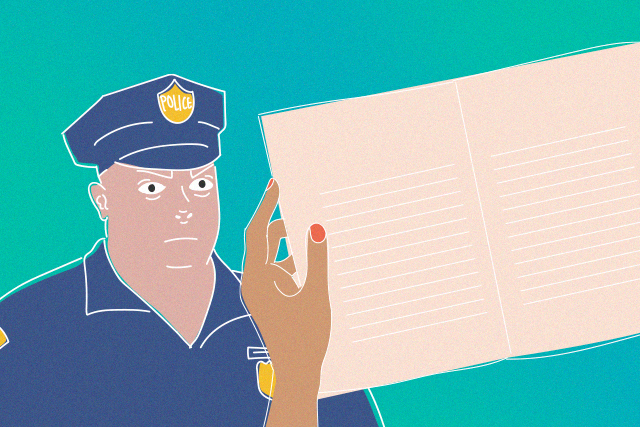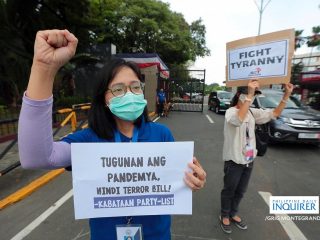Here is something that we’ve already seen before: The police force armed to the teeth in front of civilians asking to be heard. There is a history of law enforcement agencies instilling fear and abusing power that we cannot ignore in the face of the Anti-Terror Bill, which, upon implementation, could be exploited to criminalize dissent. In the United States and other parts of the world, we have also seen horrific evidence of persecution at the hands of police.
Whether or not we are on the precipice of political unrest similar to the #BlackLivesMatter movement, it’s important to educate ourselves on the possible repercussions of having a heavily policed state. Here are some reads to get you started.
“Who Do You Serve, Who Do You Protect?”
FREE ebook: Who Do You Serve, Who Do You Protect? Police Violence and Resistance in the United Stateshttps://t.co/M3wUC7zskW pic.twitter.com/4JZYC6P2qO
— Haymarket Books (@haymarketbooks) May 29, 2020
For a limited time only, Haymarket Books is giving away free digital copies of a collection of reports and essays entitled “Who Do You Serve, Who Do You Protect?” The book explores “police violence against black, brown, indigenous and other marginalized communities, miscarriages of justice and failures of token accountability and reform measures.”
Civil rights activist and writer Alicia Garza wrote in the foreword that today’s prison systems have been turned into industries that make economies dependent on policing minorities. Not only does the book talk about police killings, but it also offers alternatives for keeping communities safe. One of the contributed works is “Big Dreams and Bold Steps Toward a Police-Free Future” by social justice news site Truthout’s Rachel Herzing.
The editors dedicated it to “everyone engaged in the struggle against police violence in the United States and beyond.” If you think we’re part of that, better get your copy here.
“Freedom Is a Constant Struggle”
In this collection of works by author and Black Power movement icon Angela Davis, she makes the connections between state violence and oppression across global history. Furthermore, she challenges her audience to work towards building a world free of injustice.
Davis touches on state-funded violence and suppression but also topics like prison abolition. In a 2014 interview included in the book, Davis spoke about why she is an abolitionist: “Why is that person bad? The prison forecloses discussion about that. What is the nature of that badness? What did the person do? Why did the person do that? If we’re thinking about someone who has committed acts of violence, why is that kind of violence possible? Why do men engage in such violent behavior against women? The very existence of the prison forecloses the kinds of discussions that we need in order to imagine the possibility of eradicating these behaviors.”
If you want to learn more about committing to transnational solidarity and how to fight for systemic change, give this a read.
“Police: A Field Guide”
FREE EBOOK
Police: A Field Guide by David Correia and @tylerwall78 is a handbook to the methods, mythologies, and history that animate today’s police.https://t.co/y8jBVzSPZf pic.twitter.com/TKdksHasOB
— Verso Books (@VersoBooks) June 3, 2020
Verso Books is giving out free digital copies of “Police: A Field Guide” which is “an illustrated handbook to the methods, mythologies and history that animate today’s police.” With this survival manual, you can prepare yourself for encounters with cops and police logic. Topics include “officer friendly, Tasers, curfews, non-compliance or reformist discourses about so-called bad apples.”
David Correia and Tyler Wall wrote this book to help activists, and any critic of the government at this point, to demystify law enforcement jargon in order to keep safe. Since the Philippine police system is modeled after that of the United States, we can assume that the lingo is similar.
Is the Miranda warning the only thing you’re familiar with concerning possible arrest? Grab a copy of this book here.
“Police Violence and Corruption in the Philippines: Violent Exchange and the War on Drugs”
In a paper submitted to the Journal of Current Southeast Asian Affairs, Steffen Bo Jensen and Karl Hapal investigate “the relationship between money and violence in the Philippine war on drugs.” They argue that “we cannot dissociate the killings from the rampant corruption in the Philippine police.”
The authors stated that with the country submerged in violent police encounters, corruption and death become part of state-citizen relationships. They tackle how this reshaping of dynamics is pushing the urban poor to engage with the police under duress.
If you would like to find out why they say that the (literal and figurative) price of survival in the country has gone up, read it here.
Art by Dana Calvo
Follow Preen on Facebook, Instagram, Twitter, YouTube, and Viber
Related stories:
Apparently, raping someone is common practice for policemen
Just adding gender quotas won’t fix our institutions, agrees Sen. Hontiveros
Here’s a list of #JunkTerrorBill protests and indignation rallies
The people of the internet have spoken and they said #JunkTerrorBill


